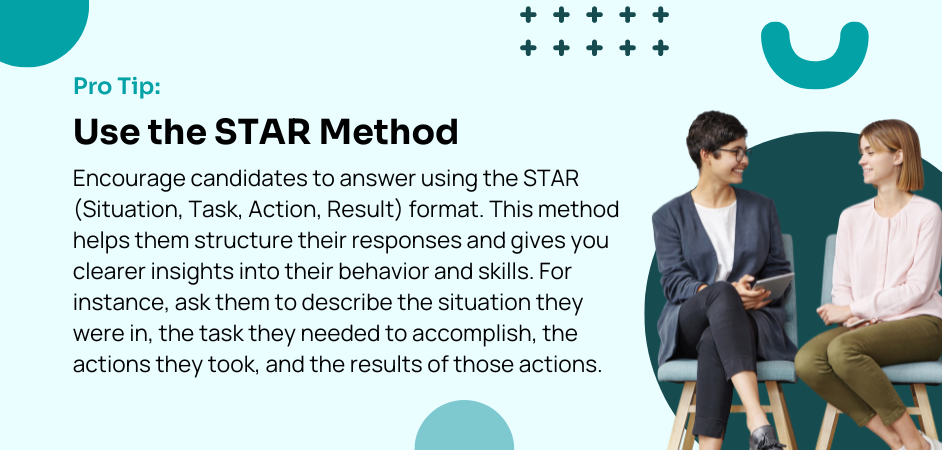Crafting a successful team starts with unearthing the right talent, and conducting effective interviews is the cornerstone of this process. Dive deep into a comprehensive guide of best practices tailored to ensure your interviews are not just structured but deeply insightful.
From preparing meticulously and creating inviting atmospheres to utilizing the power of standardized questions and behavioral interviewing techniques, this blog unveils the strategic steps necessary to identify top talent effectively.
Elevate your hiring game with these time-tested strategies and witness how structured interviews can revolutionize your recruitment approach, propelling your company towards sustained success.
Best Practices for Conducting Effective Interviews
Effective interviews are crucial in the recruitment process, as they help determine a candidate’s ability to perform the required job tasks and fit within the company culture. Here are some best practices to ensure your interviews are structured and insightful.
Prepare Thoroughly
Preparation is key to conducting successful interviews. Before the interview, review the candidate’s resume, job description, and qualifications needed for the job. Prepare a list of questions that directly relate to the job’s responsibilities and the candidate’s skills and experience.
Create a Comfortable Environment
A relaxed interview setting can help candidates give their best. Ensure the interview environment is welcoming and that the interview starts on time. Small gestures, like offering water and ensuring the room is comfortably set up, can make a significant difference.
Use a Standardized List of Questions
To ensure fairness and consistency across all interviews, use a standardized set of questions for all candidates applying for the same role. This helps compare candidates effectively and ensures compliance with legal standards by avoiding discriminatory questions.
Include Multiple Team Members
When practical, include other team members in the interview process. This can be particularly helpful, as different perspectives can assist in assessing the candidate’s skills and how well they might integrate with the team.
Focus on Open-Ended Questions
Ask open-ended questions that require more than a yes or no answer. These questions encourage candidates to speak openly about their experiences, skills, and qualities, providing deeper insight into their suitability for the role.
Allow Time for Candidate Queries
Always allow candidates to ask their own questions. This not only helps them understand the role and the company better but also demonstrates their level of interest and engagement with the position.
Using Behavioral Interviewing Techniques to Assess Candidate Fit
Behavioral interviewing is a technique for understanding how a candidate has behaved in specific job-related situations in the past. This approach is based on the idea that past behavior is a good predictor of future behavior.
Structure Behavioral Questions Around Core Competencies
Identify the core competencies or essential skills required for the job, and tailor your behavioral questions to explore these areas. For example, if problem-solving is crucial, you could ask, “Can you describe an occasion when you had to solve a challenging problem at work?”
Look for Concrete Examples
Focus on extracting concrete examples that demonstrate the candidate’s skills and abilities. Behavioral questions might include, “Tell me about a time you led a project under tight deadlines” or “Describe a situation where you had to handle a difficult client.”
Evaluate the Fit with Company Values
In addition to assessing competencies, behavioral interviews can help effectively evaluate how well a candidate’s values align with those of your company. Questions that explore scenarios relevant to your company’s core values can provide deep insights into a candidate’s potential cultural fit.
Taking Notes and Scoring Responses
Take detailed notes during the interview to capture the essence of the candidate’s answers. Consider using a scoring system for each response to help objectively compare candidates based on predefined criteria.

By implementing structured interviews and utilizing behavioral interviewing techniques, employers can gain a comprehensive understanding of a candidate’s capabilities and how well they might integrate into the company’s culture. This thorough approach is essential for making informed hiring decisions that contribute to the long-term success of the organization.
Making the Right Hiring Decisions
Making the right hiring decisions is crucial for the success and growth of any small business. These decisions impact not only the performance of your team but also the overall culture and dynamics of your organization. Here are several key considerations to keep in mind when evaluating and selecting the best candidates.
Skills and Experience Alignment
Assess whether the candidate’s skills and experiences align with the specific needs of the job. It’s important to differentiate between must-have and nice-to-have qualifications to avoid overlooking potentially great candidates who may lack specific preferable attributes but possess the crucial ones.
Cultural Fit
Consider how well the candidate’s values and behavior align with your company’s culture. Employees who mesh well with the organization’s culture tend to have higher job satisfaction, perform better, and stay with the company longer. During the interview, ask questions that help reveal whether the candidate’s professional demeanor and mindset align with your company’s core values and mission.
Potential for Growth
Evaluate the candidate’s potential for growth and development within your company. Consider their willingness to learn and take on new challenges, as these are indicators of their ability to adapt and grow as your business evolves.
References and Background Checks
Always conduct thorough reference checks and background verifications before making a hiring decision. Speaking with former employers and colleagues, and checking the authenticity of their qualifications can provide additional insights into the candidate’s reliability, work ethic, and interpersonal skills.
Team Compatibility
Consider how the candidate would fit within the existing team structure. It’s beneficial to introduce final-round candidates to potential teammates to gauge interaction dynamics and gather feedback, which can be crucial in assessing how well the new hire would integrate with the team.
Integrating HootRecruit Insights into the Decision-Making Process
Leveraging data and insights from HootRecruit can significantly enhance your ability to make informed hiring decisions. Here’s how you can integrate these features effectively into your recruitment strategy.
Candidate Scoring and Comparisons
Take advantage of HootRecruit’s candidate scoring system, which can help standardize the evaluation process. By setting specific criteria and weights for essential skills and competencies, you can quantitatively assess each candidate’s suitability for the role. Comparing candidates becomes easier and more transparent when using a standardized scoring system.
Tracking Candidate Engagement
Monitor candidates’ interactions with your recruitment process via HootRecruit. Insights into how promptly candidates respond to communications, follow through on tasks, or engage with the recruitment platform can be indicators of their interest level and organizational fit.
Historical Hiring Data
Review historical hiring data stored in HootRecruit to identify trends and determine which practices have yielded the best long-term results. Understanding what has worked (or not worked) in the past can guide you toward more successful hiring decisions in the future.
Integrating Feedback Mechanisms
Utilize HootRecruit’s features to gather feedback from everyone involved in the hiring process. This collaborative approach promotes inclusivity and provides a well-rounded view of each candidate from multiple perspectives within your company.
By considering these key factors and effectively utilizing the data-driven tools provided by HootRecruit, small businesses can enhance their ability to make the right hiring decisions. These practices help ensure that new hires are capable of performing their roles and are a good fit for the company’s culture and poised for long-term success within the organization.
Move Forward with Confidence
Small businesses face unique hiring challenges that necessitate strategic and efficient recruitment practices. As outlined in this excerpt from the HootRecruit Starter Pack: Simplifying Talent Acquisition for Small Businesses, the role of powerful job descriptions and careful candidate screening can’t be overstated.
To stay ahead and effectively navigate the complexities of talent acquisition, download the comprehensive guide and unlock valuable insights and strategies that will help your small business thrive in today’s competitive landscape. Transform your recruitment approach, optimize your resources, and attract top talent to ensure your business’s continued success. Let’s get started!

